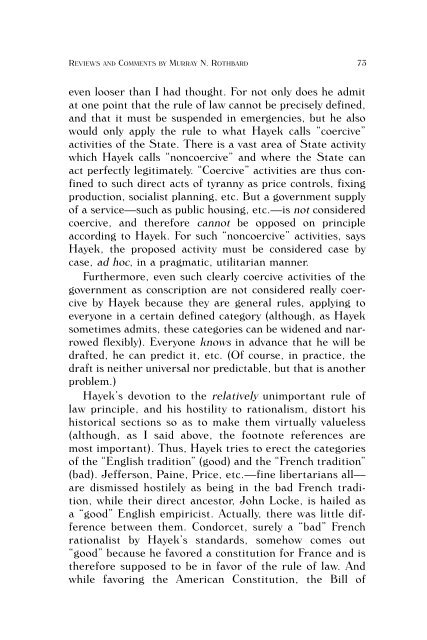Murray N. Rothbard vs. the Philosophers - Ludwig von Mises Institute
Murray N. Rothbard vs. the Philosophers - Ludwig von Mises Institute
Murray N. Rothbard vs. the Philosophers - Ludwig von Mises Institute
You also want an ePaper? Increase the reach of your titles
YUMPU automatically turns print PDFs into web optimized ePapers that Google loves.
REVIEWS AND COMMENTS BY MURRAY N. ROTHBARD 73<br />
even looser than I had thought. For not only does he admit<br />
at one point that <strong>the</strong> rule of law cannot be precisely defined,<br />
and that it must be suspended in emergencies, but he also<br />
would only apply <strong>the</strong> rule to what Hayek calls “coercive”<br />
activities of <strong>the</strong> State. There is a vast area of State activity<br />
which Hayek calls “noncoercive” and where <strong>the</strong> State can<br />
act perfectly legitimately. “Coercive” activities are thus confined<br />
to such direct acts of tyranny as price controls, fixing<br />
production, socialist planning, etc. But a government supply<br />
of a service—such as public housing, etc.—is not considered<br />
coercive, and <strong>the</strong>refore cannot be opposed on principle<br />
according to Hayek. For such “noncoercive” activities, says<br />
Hayek, <strong>the</strong> proposed activity must be considered case by<br />
case, ad hoc, in a pragmatic, utilitarian manner.<br />
Fur<strong>the</strong>rmore, even such clearly coercive activities of <strong>the</strong><br />
government as conscription are not considered really coercive<br />
by Hayek because <strong>the</strong>y are general rules, applying to<br />
everyone in a certain defined category (although, as Hayek<br />
sometimes admits, <strong>the</strong>se categories can be widened and narrowed<br />
flexibly). Everyone knows in advance that he will be<br />
drafted, he can predict it, etc. (Of course, in practice, <strong>the</strong><br />
draft is nei<strong>the</strong>r universal nor predictable, but that is ano<strong>the</strong>r<br />
problem.)<br />
Hayek’s devotion to <strong>the</strong> relatively unimportant rule of<br />
law principle, and his hostility to rationalism, distort his<br />
historical sections so as to make <strong>the</strong>m virtually valueless<br />
(although, as I said above, <strong>the</strong> footnote references are<br />
most important). Thus, Hayek tries to erect <strong>the</strong> categories<br />
of <strong>the</strong> “English tradition” (good) and <strong>the</strong> “French tradition”<br />
(bad). Jefferson, Paine, Price, etc.—fine libertarians all—<br />
are dismissed hostilely as being in <strong>the</strong> bad French tradition,<br />
while <strong>the</strong>ir direct ancestor, John Locke, is hailed as<br />
a “good” English empiricist. Actually, <strong>the</strong>re was little difference<br />
between <strong>the</strong>m. Condorcet, surely a “bad” French<br />
rationalist by Hayek’s standards, somehow comes out<br />
“good” because he favored a constitution for France and is<br />
<strong>the</strong>refore supposed to be in favor of <strong>the</strong> rule of law. And<br />
while favoring <strong>the</strong> American Constitution, <strong>the</strong> Bill of


